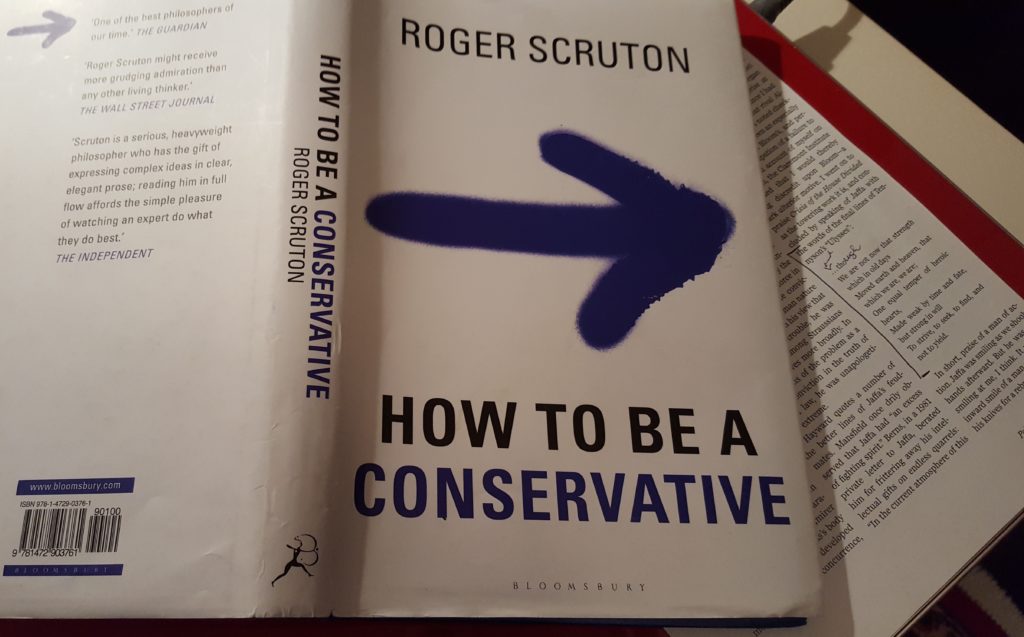…inspired by my mentor, Roger Scruton
(All quotes, unless otherwise attributed, are from How to be a Conservative by Roger Scruton.)
“It is not unusual to be a conservative. But it is unusual to be an intellectual conservative.” With these opening words in How to be a Conservative, Roger Scruton offers the reader a long, refreshing drink of water in our modern desert of progressive dogmatism and dictatorship. In 184 pages, he lays out the arguments underpinning the solid and beautiful edifice that is conservatism, and exposes the envy and lies underpinning socialism in all its guises.
Beware of anyone telling you they are doing it for your own good—they are doing it to control society, that is, for power. They cloak their pursuit in the sanctimony of pursuing equality, but show utter contempt for the crooked timber of humanity and our quest for freedom. “Human beings must be free, which means being free from the insolent claims of those who wish to redesign them.”
The progressive malaise
In their pursuit of power, the first thing progressives try to do is undermine society, defining everyone as a victim and then blaming traditional authorities and norms for all perceived ills of the victim groups. “Society, (Edmund) Burke believed, depends upon relations of affection and loyalty, and these can be built only from below, through face to face interaction. It is in the family, in local clubs and societies, in school, workplace, church, team, regiment and university that people learn to interact as free beings, taking responsibility for their actions and accounting to their neighbours.” Top-down government breeds slaves and sycophants, while liberal democratic government supplies
the conditions for society to grow from the ground up, shaped by tradition. And the tradition we are talking about is “answers that have been discovered to enduring questions” over the course of human history.
One of the first institutions progressives target for remaking society is, not surprisingly, education. This remake reared its demon head in the 1960s in Britain and North America. “It became government policy to view schools not as associations for the transmission of knowledge, with their own internal purposes that develop according to the needs and desires of their members, but as instruments of social engineering.” What better place to start than by moulding young minds in the progressive cause,
Defend nation states. Our liberal democracies are undergirded by allegiance to our nation, with the family as its basic unit. It is in the family where we have our shared identity, a shared investment of staying together despite agreements, disagreements and quarrels. “…it is the foundation of any way in life in which compromise, rather than dictatorship, is the norm.” “That is why democracies need a national rather than a religious or ethnic ‘we’”—a ‘we’ built on neighbourliness and millions of agreements over the years of what constitutes individual space and common space. The law becomes the shared legacy of the nation’s citizens, and it adapts to the changing needs and conditions of the people.
“,,,democracy needs boundaries, and boundaries need the nation state.” And this sense of place starts at the local level and grows from there to the larger entity of neighbourhood, city, state and country. A telling example Scruton gives of how a federal government grew into a nation state and not an empire is the United States.
American federalism “established a secular rule of law, a territorial jurisdiction and a common language in a place that the people were busily claiming as their home.” And this home was based on neighbourliness, with the political order growing from its obligations. Nationalism, therefore, is “the things we share with our fellow citizens, first among those being territory” followed by “the history and customs through which that territory has been settled.” And underlying it all is the rule of secular law.
Reject socialist solutions. As conservatives, we recognize the benefits we gain from living in Western liberal democracies are inestimable, and “the more we take from this arrangement, the more we must give in return. This is not a contractual obligation. It is an obligation of gratitude.” And it is manifested in the generosity of conservatives outpacing that of progressives in almost every charitable endeavour examined—surprising to progressives, not so much to conservatives.
The welfare state, on the other hand, has created a new class of dependents, people who pass their dependency from generation to generation. It erodes their dignity and saps their will, perpetuating the vicious cycle. Its costs keep increasing, causing resentment of taxpayers against welfare recipients. But the economic costs are outstripped by the human costs because it denies the individual the satisfaction of a job well done and a bill paid. It denies the dependent minority the full experience of citizenship.
This fight against socialism in all its infestations will not be won in a day or a month or a year. But it is an essential fight every conservative must join every day, every month and every year. The intellectuals in our Western democracies have perpetuated “the great socialist illusion, which is that the poor are poor because the rich are rich.” What a crock! What we must expose at every opportunity is “The real perversion (of socialism) is a peculiar fallacy that sees life in society as one in which every success is someone else’s failure.” Progressives will never acknowledge that consensual agreement benefits both parties, something that any adult with a brain cell still functioning instinctively understands. The socialist view of life is based on envy, on malice toward the successful, which the current ‘social-justice warrior’ has masked as compassion for the underdog—a powerful strategy because decent human beings are disposed to cheer for the underdog.
Defend capitalism. “…that private ownership and free exchange are necessary features of any large-scale economy.” Counter anyone who spouts the control economy of socialism with von Mises’ and Hayek’s reasons: “First, economic activity depends upon knowledge of other people’s wants, needs and resources. Second, this knowledge is dispersed throughout society and is not the property of any individual. Third, in the free exchange of goods and services, the price mechanism provides access to this knowledge.” And the social order in a liberal democracy spontaneously places constraints on the market through its customs, laws and morals.
To be conservative is to distinguish between that which has a price, and therefore is exchanged via capitalism, and that which is priceless—love, sex, beauty—and therefore is governed by religious/spiritual values. “We cannot now escape from the ‘commodification’ of life that prosperity has naturally brought us. But we can strive to discipline it through good taste, the love of beauty and the sense of decorum.”
to be continued…





